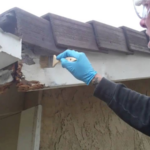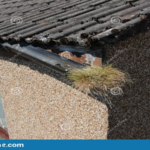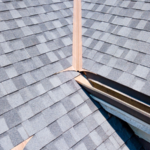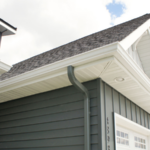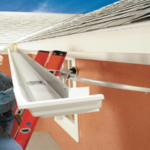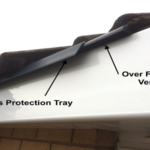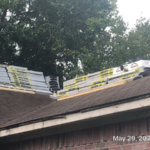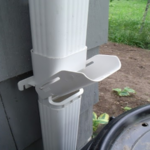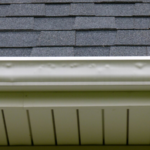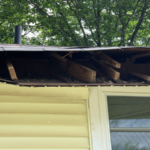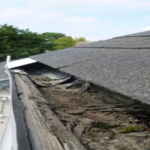If your gutters are overflowing, it’s likely due to a blockage somewhere along the line. If you have a gutter guard system, the issue may be with the gutter itself or the downspout. To clear a blockage, you’ll need to remove the debris by hand. Once the gutters are clear, flush them with a hose to ensure the water is flowing freely.
If your gutters are still overflowing after you’ve cleared the debris, it’s possible that the downspouts are clogged. To clear a clogged downspout, you’ll need to detach it from the gutter and use a plumbers’ snake or a garden hose to clear the blockage.
What happens if gutters overflow?
If your gutters overflow, it can cause a number of problems. First, the water can damage your home’s foundation. Second, the water can seep into your home’s interior, causing mold and mildew. Third, the water can create a breeding ground for mosquitoes and other pests. Finally, the overflow can cause your gutters to pull away from your home, which can lead to expensive repairs.
Is it normal for gutters to overflow in heavy rain?
There are a few reasons that your gutters might overflow during a heavy rain. One reason could be that your gutters are full of debris and need to be cleaned out. Another reason could be that your downspouts are clogged and need to be cleared. If your gutters are overflowing, it is important to take action to prevent water damage to your home.
Can gutters cause leaks inside the house?
If you have a gutter that is not draining properly, the water can build up and overflow. When this happens, the water can seep into the house through cracks or holes in the foundation, causing leaks.
How do you deal with gutter overflow?
- Use a gutter guard: A gutter guard is a simple and effective way to keep your gutters clear and prevent overflow.
- Clean your gutters regularly: Regular cleaning of your gutters will ensure that they are clear and able to function properly.
- Repair any leaks: If you have any leaks in your gutters, be sure to repair them as soon as possible.
- Install a gutter extension: A gutter extension can help to redirect overflow away from your home and prevent damage.
How do you tell if gutters are overflowing?
If gutters are overflowing, it is usually due to a blockage. To check for a blockage, first inspect the gutters for any debris. If you see any, use a garden hose to clear it out. If the gutters are still overflowing after you clear the debris, then there may be a problem with the downspout. To check the downspout, remove the elbow joint and inspect the pipe. If the pipe is blocked, use a plunger to clear it out.
Why is water pouring over my gutters?
There are a few reasons why water might be pouring over your gutters. One possibility is that the gutters are clogged with debris, leaves, or twigs. This can cause water to build up in the gutters and eventually overflow. Another possibility is that the gutters are old or in disrepair, and are no longer able to properly channel water away from your home. If your gutters are leaking, they may also be causing water to pour over the edge.
Can overflowing gutters damage roof?
If your gutters are overflowing, it is likely because they are clogged. When gutters are clogged, the water has nowhere to go but over the edge of the gutter, and onto your roof. This can damage your roof in a number of ways. First, the weight of the water can damage or even break your roof tiles. Second, the water can seep under your shingles and cause them to rot. Third, the water can saturate the insulation in your attic, leading to mold and mildew. If you have an overflowing gutter, it is important to clean it out as soon as possible to avoid any damage to your roof.
Can overflowing gutters cause leaks?
If your gutters are overflowing, it’s likely because they’re clogged. When gutters are clogged, water can’t flow through them properly and will instead spill over the sides. This can cause water to leak into your home through the roof or foundation, causing serious damage.
Is standing water in gutters bad?
Standing water in your gutters is a problem for several reasons. First, it’s unsightly. No one wants to look at a home with dirty, cluttered gutters. Second, standing water can attract pests, like mosquitoes, rats, and snakes. Third, the weight of the water can cause your gutters to sag and pull away from your home, which can lead to costly repairs. Finally, standing water is a breeding ground for mold and mildew, which can cause respiratory problems for you and your family.
Final Word
If your gutters are overflowing, it’s important to take action to prevent water damage to your home. You can either clean out your gutters or install gutter guards to keep them from overflowing in the future.

